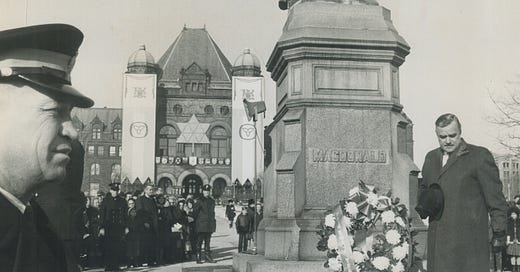Weekend reads: The perils of 'presentism'
A Q&A with author and Canadian history teacher J.D.M. Stewart

In the wake of 2020’s mass protests, Western countries continue to grapple with how to tell the stories of their nation’s past — and how to evaluate their historical figures. The Canadian Institute for Historical Education recently hosted a lecture series about this very issue. The trio of events, titled “Sir John A. Macdonald in Historical Context,” focused on Canada’s founding prime minister, whose statues and plaques have been removed from many public spaces across the country in response to his treatment of the country’s Indigenous population.
J.D.M. Stewart has been a Canadian history teacher for nearly 30 years, and is the author of Being Prime Minister. Along with Trent University professor Christopher Dummitt and University of Toronto professor David Wilson, he participated in the third colloquium in the Canadian Institute for Historical Education series.
Here, Stewart — who is currently writing a new book on Canadian prime ministers — speaks with Lean Out producer Harrison Lowman about the perils of presentism.
HL: The title of your recent event was “Presentism … Or is it ‘Generational Chauvinism?’” Can you unpack that theme for us — what do you take it to mean?
JDMS: I take it to mean evaluating historical figures and periods by the standards of your own period. So, you apply your version of morality, and context from today, to a period that happened a long time ago.
HL: Is this a new phenomenon?
JDMS: I don’t know how new it is, but I think we’re doing it more today because we’re trying to fight injustices from the past … To some extent, it’s about trying to understand today better. But it’s really about trying to make us feel better today by looking at, and holding to account, people from previous generations.
In Canada there has been a lot of history coming to a greater awareness, whether that is residential school history [or] other histories of marginalized peoples … Those stories are coming to the fore now and we’re saying, “Oh my God, I can’t believe that happened.” But we’re applying our own sensibility to it. Of course, we can’t believe that happened. We would never do that today. But for some reason people say, “Those people should have felt the way I do today.” And that’s not historically sound.
HL: How would you diagnose the health of Canada’s national consciousness today?
JDMS: I think the national consciousness — the awareness of who we are as a country, and what holds [us] together as an identity — is very fragile right now. Part of that is due to the continuing effects of a poor history education. Part of it is due to a government that does not think Canadian history is important. And so, we find ourselves in 2023 in a desert, when it comes to our understanding of each other. No one is really talking about those things that bind us together as Canadians.
HL: Is this distinct from what’s going on in other countries in 2023? Compare us to France, or the U.K. or the U.S. — how do we measure up?
JDMS: Those countries are different from Canada. Canada is a place that actually needs a lot of nurturing, because it is geographically huge, it is regionally diverse, it is demographically diverse. Its linkages are kind of tenuous, as they have been since 1867. I wouldn’t compare us to the United States, or France, or the United Kingdom. Those countries have a different DNA.
Canadians have always needed to be cognizant of the challenges of being united. [Canadian journalist] Roy MacGregor once defined us as the “bumblebee nation.” You look at a bumblebee and you’re like, “How the hell does that thing fly?” You look at Canada and you’re like, “How the hell does that country work?”
HL: You’ve been teaching for almost 30 years. How would you characterize the pressure that elementary and high school teachers are currently under, in terms of teaching, discussing, and debating history?
JDMS: I can mostly only speak to grade seven and up. When George Floyd [was killed] there was a racial reckoning around the world, including in Canada. Everyone was turning to history classes to solve the problems. It put quite a bit of pressure on teachers to try to solve those problems. There were necessary changes that were needed in the teaching of history.
HL: Is there an anxiety about teaching certain things?
JDMS: Yes, because there is now no room for error. If you make an honest mistake, you can be called out on it. You could be called out by a student, by an administrator. It’s not a forgiving atmosphere. We live in a “gotcha” world right now.
I think a lot of teachers actually avoid certain subjects because it could be too dangerous to their job. In teaching over the last several years, [administrators] would say, “We’re going to have hard conversations, because this is a difficult time.” And then I’d say, “We’re not going to have any hard conversations, because everyone is afraid to say anything!” So, that’s the irony. They say, “We’re going to have hard conversations, we’re going to be vulnerable, and we’re going to speak our truth.” Are you kidding me? No one is going to say anything.
HL: You were dragged into an administrator’s office for writing an op-ed. What happened?
JDMS: I was writing about John A. Macdonald and the whole statue issue, and his handling of Indigenous issues as prime minister. I guess I wasn’t supposed to do anything other than criticize John A. Macdonald. But I tried to point out that history is a very complicated topic. People today want to see it as black and white.
HL: Another point you raised is there is a shift away from teaching about major historical figures — the people that shaped the country. Why do you think that is?
JDMS: Part of the reason is that, if you look at prime ministers, they’re all white. Identity is a big part of history right now. There’s a wish to look at more diverse voices in a history class ... But there’s a whole variety of great Canadians to talk about from all walks of life. And that’s what I would do in my classroom, [teach both]. There’s everybody from Oscar Peterson to Tom Longboat to Wilfrid Laurier, Glenn Gould, Kenojuak Ashevak, and Matthew Coon Come. You should be throwing in a diverse list.
HL: During the wave of statues being toppled and plaques being taken down, there was a lot of talk about reassessing historical figures. But then, in many cases, nothing seems to have happened since. In 2021, Libraries and Archives Canada quietly deleted its entire history of prime ministers on its website. Written in 1994, it was definitely outdated; for example, it didn’t even mention the residential schools. But they said content would be rewritten to ensure it was “accurate and up to date.” And yet, years later, I think you still get an error page when you search it. And then there’s the Sir John A. Macdonald statue in front of Queen’s Park, the Ontario legislature, in Toronto. It’s been boarded up since August 21, 2020, with the face covered by a garbage bag. No decision has been made by MPPs [Members of Provincial Parliament] on what to do. We seem to be in this period of stasis. Why do you think that is?
JDMS: I’m surprised by it, to some degree. I think it’s a lack of political leadership. And it’s a lack of historical education. Because people still have this belief that the only thing John A. Macdonald did when he was prime minister was create residential schools and abuse First Nations people. Three residential schools were created when he was prime minister. People don’t want to approach issues with any nuance or understanding. To really understand Sir John A. Macdonald takes a bit of work, takes a bit of time. This is a world of dismissing other people’s views and not listening. So, it’s a lot easier to tear down than it is to find out and educate.
HL: But what do we say to an Indigenous student — maybe he’s even in your class — who has read about Sir John A. Macdonald’s characterizations of First Nations people as “savages”, who has read how he helped implement what became the modern residential school system? And then that kid has to walk past that statue of the former prime minister on his way to school each day. He looks up at it, and this guy is literally on a pedestal, and he feels hurt. What do we say to that kid?
JDMS: We say, “You’re right and I understand why you would feel hurt by that part of history. And I’m sorry that that is part of your experience.” And then we might ask a question: “What else is there to the legacy of Sir John A. Macdonald?”
So, we have a conversation, and we listen to each other. I validate that person’s feelings. But let’s also talk about what it might have been like to be alive in the 1880s, and what the mentality might have been of people who lived at that time. Let’s talk about what has happened since then. What is the arc of Canada since that time?
Hopefully we can both come to an understanding that Sir John A. Macdonald did some ruthless and awful things in his leadership as prime minister. But there is also this other side of his leadership that led to the country we’re still standing in now.
This interview has been edited and condensed.





The Residential School file is another one that Legacy Media has bungled by reporting from an ideological standpoint instead of seeking the truth. I dismiss whatever they have to say. I must struggle to discover the truth for myself, and find they have muddied the waters AGAIN!
I hope they take their government cheques and choke on their caviar.
When we judge people in the past by the standards of today there is an arrogance implicit in that which is the belief that if we ourselves were raised in the environment of the past, we would have been different. For example, most people would claim that if we plopped them down in the 18th century they would have of course have grown up to have absolutely correct 21st century progressive values and would have been dedicated anti-slavery activists and therefore it is acceptable for them to pass judgement on the real people of the past who were not as virtuous. The reality is that slavery was such a completely normal and accepted part of human life for thousands of years that to only the most visionary and principled persons would it occur that it could and should be abolished. 99.9% of us would simply have gone along with the times and so are on very shaky ground when harshly judging people of the past.